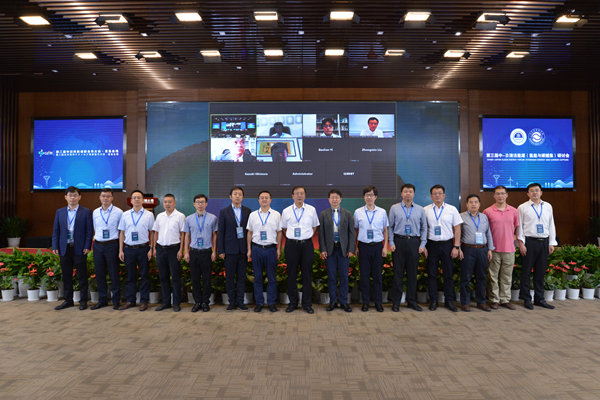On September 27, the 3rd China-Japan Clean Energy Forum on Hydrogen Energy and Carbon Capture was successfully held both online and offline. Serving as the venue of the 2nd China-Japan Scientific and Technological Innovation and Cooperation Conference hosted by Shandong Provincial Government in Qingdao, this forum was guided by the Department of Science & Technology of Shandong Province, Japan International Science and Technology Exchange Center, and the Bureau of International Cooperation Chinese Academy of Sciences, and hosted by Qingdao Institute of Bioenergy and Bioprocess Technology, Chinese Academy of Sciences, and Shandong Energy Institute. Academician LIU Zhongmin, Director of Qingdao Institute of Bioenergy and Bioprocess Technology, Chinese Academy of Sciences chaired this forum.

Japan and China declared the goals of achieving "carbon neutrality" by 2050 and 2060 respectively. To realize "carbon neutrality", it is crucial to develop hydrogen energy and fuel cell, and promote the low-carbon transformation in the energy and chemical industry and related fields. This forum focused on the theme of "Hydrogen Energy and Carbon Capture". Based on years of communication and cooperation between the scientific and technological professionals of the two countries, the forum has invited YI Baolian, member of the Strategic Committee of China Hydrogen Alliance, academician of Chinese Academy of Engineering, Hideto Matsuyama, former Chairman of Aseanian Membrane Society, professor of Kobe University of Japan, and Professor Ferdi Schüth, former Chairman of the International Max Planck Research School of Germany, academician of German Academy of Sciences to deliver keynote speeches. Approximately 100 experts and students from China, Japan and Germany participated in the academic communications, covering the topics of water-electrolytic hydrogen making equipment, fuel cell, CO2 capture, etc. The forum highlighted discussions regarding the key scientific issues and technological difficulties for the critical material, parts and techniques.
LYU Xuefeng, Deputy Director of our institute presided over the opening ceremony and the keynote speeches. LI Chulin, member of the Party Group of the Department of Science & Technology of Shandong Province, Okimura Kazuki, President of Japan Science and Technology Agency, and Chen Haitao from the Asian and African Affairs Division of the Bureau of International Cooperation Chinese Academy of Sciences delivered speeches.LIU Zhongmin said that, in recent years, both the Chinese and Japanese governments had issued and implemented a series of policies and measures to reduce carbon emission intensity, promote the efficient utilization of clean energy, and facilitate green and low-carbon development. China and Japan have urgent demands for technologies and cooperation in the green hydrogen industry and carbon capture. This forum aimed to gather the high-end brainpower of scientists from both countries, and inspire innovative thinking, thus promoting the academic exchanges and cooperation in green hydrogen and carbon capture between China and Japan.
As the Chinese special guest, YI Baolian delivered a keynote speech titled "Current Situation and Prospect of Fuel Cell Vehicles". He said that, in order to reach carbon emission peak and carbon neutrality by 2030 and 2060, we had to strive to develop renewable energy, and use renewable energy to prepare water-electrolytic hydrogen, so as to realize energy storage and redistribution of renewable energy, as well as low-carbonization of traditional industries. As the Japanese special guest, Hideto Matsuyama delivered a keynote speech titled "Membrane Technology for CO2 Separation in Membrane Center in Kobe University". He introduced the work of the only membrane research center in Japan driven by a university since its establishment six years ago. The center achieved innovative R&D of membrane and membrane techniques aimed at solving global warming caused by CO2, conducted fundamental research and application research, and made breakthroughs in CO2 separation research by cooperation and coordination, thus contributing to the building of a sustainable society. The forum also invited Ferdi Schüth to introduce the hydrogen layout in Germany's future energy system, the urgent technical bottleneck and systematic difficulties, and the key scientific and technological support on the hydrogen industrial chain.
20 experts and scholars from Qingdao Institute of Bioenergy and Bioprocess Technology, Chinese Academy of Sciences, the National Center for Nanoscience and Technology, Peking University, Tianjin University, Dalian University of Technology, East China Normal University, Ocean University of China, Dalian Institute of Chemical Physics, Chinese Academy of Sciences, Changchun Institute of Chemical Physics, Chinese Academy of Sciences, Tokyo University, Kyoto University, Hiroshima University, Yokohama University among other institutions participated and introduced their work. At the closing ceremony, Jiang Heqing, researcher of our institute summarized that, during this forum, scientists from China and Japan carried out in-depth and broad communications in the area of hydrogen energy and carbon capture, and that he believed the two sides would deliver new fruits of cooperation through this event.
The forum was broadcast live online, attracting totally 7000 audiences to watch and interact, effectively expanding the promotion and communication.

The annual China-Japan Forum of Qingdao Institute of Bioenergy and Bioprocess Technology, Chinese Academy of Sciences aims to implement the Memorandum of Cooperation on Science and Technology signed by Shandong Provincial Government and Japan Science and Technology Agency, and is an important measure to promote a regular communication mechanism for key and core technologies. In recent years, our institute has carried out various scientific and technological exchanges and communication with Japanese partners. In recent five years, the two sides have jointly undertaken many intergovernmental, and institutional cooperation projects, and produced 44 high-level theses, forging a network for firm cooperation. In the future, the institute will orientate towards the major national strategic demands of carbon emission peak and carbon neutrality, further leverage the existing cooperation foundation and advantages, gather top talents from both sides, and push forward scientific and technological cooperation featuring "talent-project-platform" integration and complementary advantages.
(Text by XUE Song, YANG Xutong; Image by Organizing Group)

